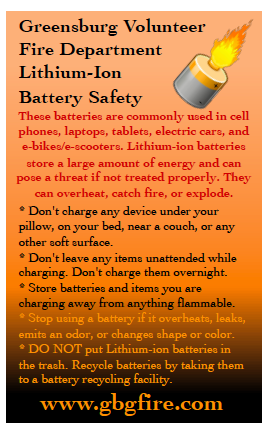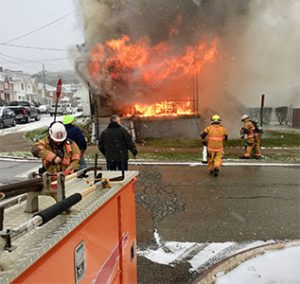Lithium-Ion Battery Fires
Lithium-ion batteries play an important part in everyday life and have become the industry standard for rechargeable batteries that are common in many home electronics. When lithium-ion batteries overheat, are used the wrong way, or are defective, they are prone to explosions which can result in injuries and fires. There were at least 25,000 incidents of fire or overheating in lithium-ion batteries over a recent five-year period, according to the U.S. Consumer Product Safety Commission. The central risk with lithium-ion batteries is fire. The batteries are unlikely to catch fire – but they can, through faults inside the battery, or from external damage. And when they do catch fire, the consequences can be serious. Lithium-ion batteries sparked more than 200 fires in New York City in 2022, killing six people and injuring nearly 150. That’s double the amount of battery fires in 2021, according to the New York City Fire Department.

Lithium-Ion Battery Fires

Why do Lithium Batteries Catch Fire?
Most fires that occur from lithium batteries are due to thermal runaway. A thermal runaway happens when conditions are met that cause reactions to occur and cannot be easily stopped. These reactions are exothermic, meaning that they give off heat, and that heat may be enough to cause a fire. We know that physical damage or electrical abuse, such as short circuits, overcharging, and exposure to elevated temperatures, can cause a thermal runaway. Additionally, manufacturer defects, such as imperfections and/or contaminants in the manufacturing process, can also lead to thermal runaway.
Thermal Runaway in Lithium Batteries
During thermal runaway of battery, a reaction can occur, which vaporizes the organic electrolyte and pressurizes the cell casing. If, or when, the case fails, the flammable and toxic gases within the cell are released. Once a thermal runaway starts, the process cannot be stopped, even by unplugging the battery. Even worse, you may not know when this runaway starts. Therefore, it is best to make sure that the battery is being charged in a safe place where other fuels will not be ignited. To minimize the possibility of thermal runaway the battery, charger, and device manufacturers use battery management systems to make sure that the batteries are operated within a voltage, current, and temperature range that is considered safe. For example, if a lithium-ion powered device says the battery is dead and the device will not operate, the actual battery is not dead, instead, it has reached the lower level of safe operation and a good management system will not allow the use of the device.
How to Prevent Lithium Battery Fires (10 Tips)
There are a few things we can do to prevent lithium batteries from causing damage to our homes or businesses and injuring those nearby.
- Only buy batteries that are from reputable manufactures.
- Do not charge non-rechargeable batteries.
- Keep batteries away from high temperatures.
- Do not keep batteries on a charger once the charging cycle is completed.
- Only charge batteries when you are home or present to monitor the process.
- Use only the charger that came with the battery or a battery that is listed by the manufacturer as compatible with the battery.
- If possible, try to charge a battery in a fire-safe charging bag.
- When storing an item with a lithium-ion battery, remove the battery from the item if possible.
- Inspect batteries when they are first installed and after charging if possible. If you notice damage to the battery, do not recharge it.
- If you feel excessive heat coming from the charging device, remove the item from the power source and place it away from and combustible items until it has cooled down. Call the fire department if needed. Replace the battery as soon as possible.


